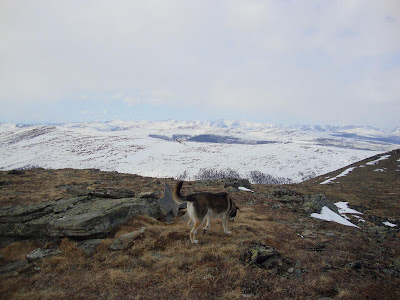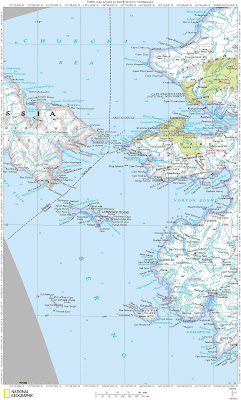There was only time for one more short outdoor trip last weekend in the Interior, before we have to consolidate the A.P.R. research center material for our upcoming move to Anchorage just over three weeks hence.
We decided to look for shed caribou antlers off of the Pinnell Mountain Trail, which is 120 km east of Fairbanks, on the north side of the Steese Highway. This is the 45 km trail your lead author fast-packed in 8/08 in 9.5 hours, followed by a 32 km 2 hour bike ride, back to our vehicle at the start. A great outing in perfect weather. http://akprogressive.blogspot.com/2008/09/pinnell-mountain-fast-pack-friday-82908.html
Last weekend though was quite a bit colder, and with still fairly extensive snow cover, since the start of our quest was at 1000 metres, with higher terrain behind.
At the start it was about -3C with about a 20kph southwest breeze. After a few km of patchy snow cover, we got to more uniform cover, about 300 metres higher, packed hard and into interesting drifts and dunes by the ceaseless winds at these exposed, higher elevations. Tree line here is only around 1000 metres, not because of the harsh winter conditions, but due to the cooler growing season temperatures. Whenever any kind of low pressure system travels through Interior Alaska, temperatures in the lower valleys, like around Fairbanks, may drop to 10-13C, with cool, wet weather. Up here though, temperatures may only be 2-5C, with strong winds, at the same time. Our black and white spruce need a certain number of growing season hours (we forget the exact number) to be over 10C, which doesn't happen above about 1000 metres (though that is changing).
We had to go up and down some quite steep pitches, mainly following the cairn-marked Pinnell Mountain Trail. It was easy to keep a good grip though with my snowshoes on the hard wind-packed snow.
Mattie and Homer, of course, had no problem maintaining their grip, with their four-pawed traction devices.
About 10km in, the snow cover became patchy as we approached Table Mountain (in the far distance, in this photo), a flat-topped summit that rises about 200 metres above the windy exposed saddle at it's base.
I was making very good time with my light 12kg pack with just overnight supplies, my -30C down sleeping bag and 0.8kg ultra-light tent. So much so, that as I approached the base of Table Mountain, I just didn't want to stop and take off my snowshoes, as we walked across the rocky ground, and started up the mountain. Not a good idea. The gripper on my left snowshoe caught on a rock, and I fell right onto another one, striking my fibula bone, right below the knee. It was quite painful, and while I collected myself for a few minutes, Mattie and Homer were licking and nuzzling me, making sure I was alright. Since I was wearing my thick mountaineering pants, I did not receive a big gash, but swelling started immediately. After about five minutes, I started back up the mountain. It only took about 15-20 minutes to reach the top.
We decided to set up camp here on the flat top of Table Mountain, it was only about 12km, and 3 hours in from our start at 12 Mile Summit. The view up there was very nice, looking out on all sides, down into different drainages, with a very large area to walk around on and set up camp. With some good snow patches for water, as well. It was here that I realised, I could hardly lift up my left leg, from the swelling. After setting up camp though, we decided to keep exploring. As long as I took short steps without too much leg lifting, the pain was manageable. And we wanted to find some antlers!
So we left camp, and kept walking down the Pinnell Trail, and off the sides, looking for likely antler shed sites. The trail after Table Mountain traverses a vast expanse of summits and saddles, for another 35 km, until it intersects the Steese Highway again at Eagle Summit.
We went about another 8km before we decided to turn back to our camp. I didn't want to aggravate my leg injury, the pain was constant, but not intolerable. We never did see any antlers, unfortunately. My anter-expert friend Matthew told me yesterday though, that the best places would have been lower anyway, nearer toward tree-line. As they shed then in February, and the caribou wouldn't want to be up on these higher, windier, harsher areas when that happens. Oh well...
There were still alot of steep ups and downs, on this part of our hike, out from, and then back to camp. It became more painful on the uphills, where I hit my leg, the swelling was definitely noticeable, and I could barely lift it. Even the back of my leg behind the knee was painful.
Getting back to camp was a relief. After dinner we all had a relaxing time in the nice evening light, sitting out (while I was bundled up in my camp chair) in the -9C 20kph breeze, enjoying the view.
After sitting out for a few hours, reading a good book, I was getting cold, and it was time to get into the tent and my -30C down bag. Sunset now isn't until after 10 pm, and it's not fully dark overnight.
Mattie and Homer were quite content to run around all night in the wind, judging by the sounds I heard outside the tent. I slept well though, in the cosy bag, getting up at 0800 sunday morning. Unfortunately, the 20 kph breeze of yesterday had turned into a 60kph gale overnight, from the east. The temperature was a little warmer though, about -2 or -3C. Unfortunately, I was running an experiment. I brought my lightweight butane-fueled Jetboil stove, to see how well it would work in these conditions. I was told when I bought it, that it would not work well below about minus 15C, so I never used it in those conditions, always used the white-gas fueled Whisper Lite. The Jetboil barely worked sat. evening at -10C, and sunday morning, not at all, even though it was somewhat warmer. Probably because the fuel canister stayed cold all night. What a bummer, no hot breakfast, coffee, and most importantly, extra water! I only had a little left, counting on being able to melt some more with the stove.
This situation, combined with my compromised leg, meant we had to pack up and get out fairly quickly. It was quite a chore packing up the tent in the roaring gale. One of my stuff sacks blew down the mountain, without my knowing it. Mattie came trotting back with it, after running down the mountain. She sure is smart and helpful! I was in more pain on our 12km walk back to the car. I also went slower, to make sure there would be no falls, and took off the snowshoes in the rocky sections. By the time we got back, three hours later, I was very thirsty, and pretty hungry, since breakfast was only two energy bars, totalling about 500 calories. Still, it was a fun outing, in beautiful weather, with nice views, just what we needed, before having to start getting ready for our move. Now that I know more about the Caribou shedding habits, the next quest will be successful.
OIL WOES
By now, you have probably read about, or seen on broadcast news the Jamaica-sized oilslick being produced from the blown-out British Petroleum (BP) well, 90 km off the Louisiana coast, which is 1500 metres underwater. http://www.commondreams.org/headline/2010/04/29-3
This may end up being the worst ecological disaster in US history, and we feel very badly for all the people on the Gulf Coast, who make their livelihoods from the fisheries, and tourism in the area. Because they will surely be affected adversely, as the people around Prince William Sound, here in Alaska were in 1989, by the Exxon Valdez disaster. (and from which Exxon is still trying to evade paying out court-ordered damages, 21 years later!).
As Dave Lindorff's article, here, http://www.commondreams.org/view/2010/04/28-2, states, opening up more coastal/oceanic areas around the US, especially in the Arctic, to offshore drilling, is courting more disasters, like the current one.
The Beaufort, Chukchi and Bering Seas, where oil exploration is already underway, have extremely treacherous weather. During the half of the year when they are not ice-covered, gale and storm-force winds occur regularly when strong low-pressure systems transit through these areas. And these low pressure systems are becoming stronger, and extending later into the fall months now that the climate is warming. Seas of 5-10 metres build up in these storms. Now imagine some sort of accident similar to the current one occuring, say in late October. By late October, well-below 0C winds can generate heavy freezing spray. Which can jeopardise any vessels, when ice builds up on the superstructure. Sometimes causing them to capsize.. Many ships have been lost over the last few centuries, because of that. The Chukchi Sea and northern and central Bering Sea then start freezing up in November (and still will for at least another 20 to 30 years). The Beaufort sea begins freezing in late October. So an uncapped well would then be trapped under the ice for several months, with no work able to be done. Can you imagine the disaster that would create? And for oil supplies that would barely put a dent in the annual US need. Is it really worth it?
How about mandates to double all automobiles gas mileage (which can easily be done with existing technology), and subsidising focused conservation efforts for residential, commercial, industrial, and government buildings. Just these two factors could halve US oil use in less than a decade (and CO2 emissions). But, as we know, the profits in these kind of initiatives aren't as high, and in a short-enough term, for the right people and corporations, as our sociopathic Capitalist/Corporate system requires. http://akprogressive.blogspot.com/2010/01/legitimised-sociopathy.html
Remember, as our ex-Vice President, Mr.R. Cheney famously said, in 2002: "THE AMERICAN WAY OF LIFE IS NON-NEGOTIABLE." [although it would take the resources of several Earth's to give the entire planet "the American Way of Life", eds.] Cheers.
p.s. This just in:
http://www.truthout.org/whistlelower-bps-other-offshore-drilling-project-gulf-vulnerable-catastrophe59027
A whistleblower from the energy company British Petroleum http://en.wikipedia.org/wiki/BP, has documents proving that they willfully and knowingly disregarded numerous safety regulations and procedures in the construction of the giant Atlantis oil platform. 320 KM south of New Orleans, it's been pumping 8.4 million gallons a day since it's completion in 2007!. This was done to save time and money.
An explosion like the one at Deepwater Horizon, which killed 11 workers (who are still missing-weeks later), would create a spill 30X WORSE than the Deepwater Horizon one.
This is a story with big implications. We'll be sure to keep abreast of it.
p.s. This just in:
http://www.truthout.org/whistlelower-bps-other-offshore-drilling-project-gulf-vulnerable-catastrophe59027
A whistleblower from the energy company British Petroleum http://en.wikipedia.org/wiki/BP, has documents proving that they willfully and knowingly disregarded numerous safety regulations and procedures in the construction of the giant Atlantis oil platform. 320 KM south of New Orleans, it's been pumping 8.4 million gallons a day since it's completion in 2007!. This was done to save time and money.
An explosion like the one at Deepwater Horizon, which killed 11 workers (who are still missing-weeks later), would create a spill 30X WORSE than the Deepwater Horizon one.
This is a story with big implications. We'll be sure to keep abreast of it.














